In our last post we discussed how to read the specification sheets from different manufacturers. If you missed it, you might want to check it out before you continue here…
Is the type of RV really that important to my truck selection?
If you already have the truck that you plan to use for your RV travel, you will be working backwards in this discussion. No matter what, proper compliance with specifications is not only your obligation (as defined by state law) but also can help prevent a serious accident.
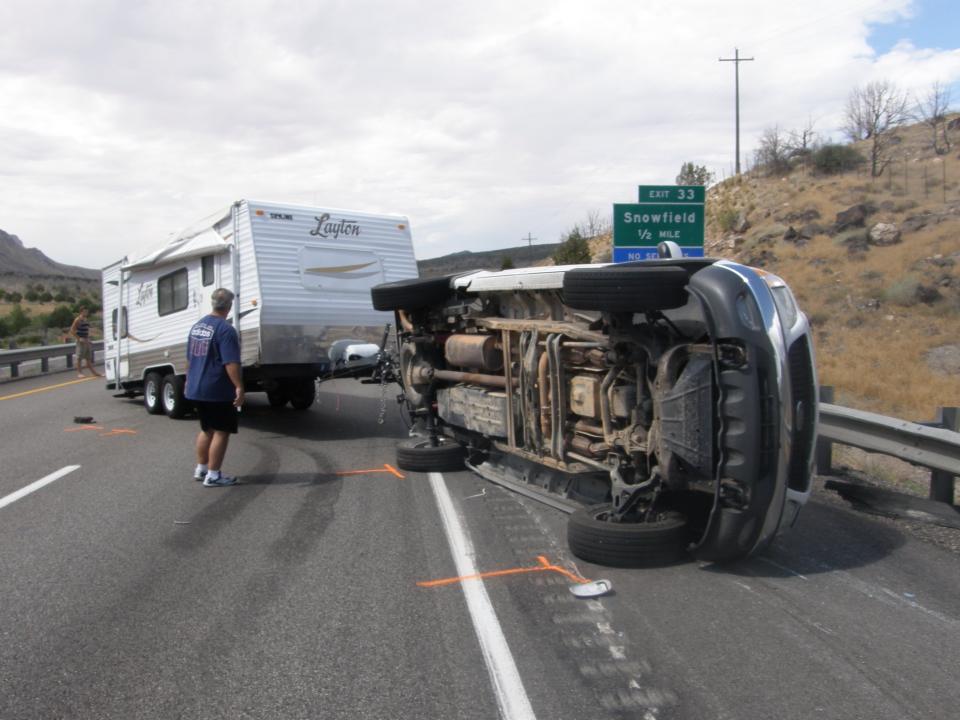
Even the nicest of trailers cannot be justified against an accident; properly match your trailer to your truck or trade your truck for a vehicle that matches your trailer.
Travel Trailers (or “Bumper Pulls”)
These are the most popular kind of RV trailer in use. These are best suited for people who want to be able to experience RV camping without the financial investment that is required when purchasing a Class A or C or properly equipping a vehicle and purchasing a fifth-wheel. Looking for more information on different RV types? Check out our blog post for more details on the wonderful world of RV travel!
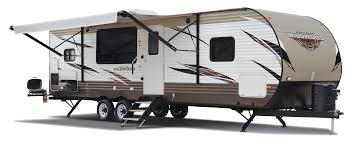
Travel trailer owners enjoy great flexibility with who and how their travel trailer can be towed. Many large SUVs and almost all half ton trucks (F150, Ram 1500, Silverado 1500) have enough towing capacity to accommodate any travel trailer on the road (with exception of travel trailer toy haulers and the biggest in the travel trailer category). This means that so long as the vehicle has a hitch receiver you can hook up to tow – BUT ARE YOU SAFE?
The answer to this question is one of the most important, and most complicated, of all the “capacity” questions you will ask – it is the question of PAYLOAD.
What is “Moment?”
Moment, in the context of trailers, is the amount of “effect” or “weight” placed on the hitch point.
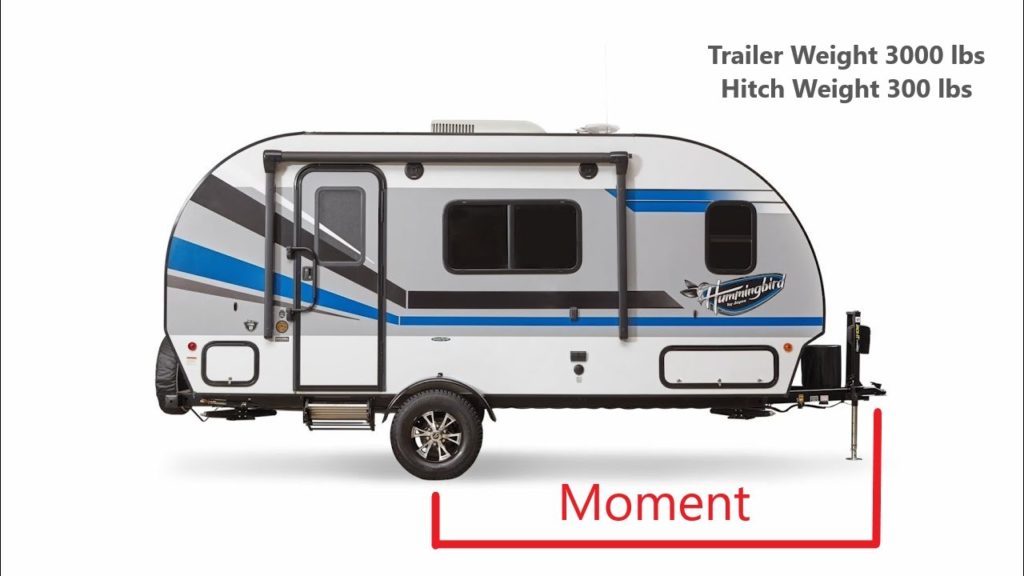
On average, the hitch weight (or tongue weight) is 10% of the total trailer weight. However, as you add items (thus adding weight) in front or behind the balance point (the trailer axle), you will affect the hitch weight the same way that a teeter-totter works.
Not exact calculations, but given for illustration – if we add 100 pounds just forward of the axle, the moment raises slightly and so does the weight held by the hitch – hitch weight.
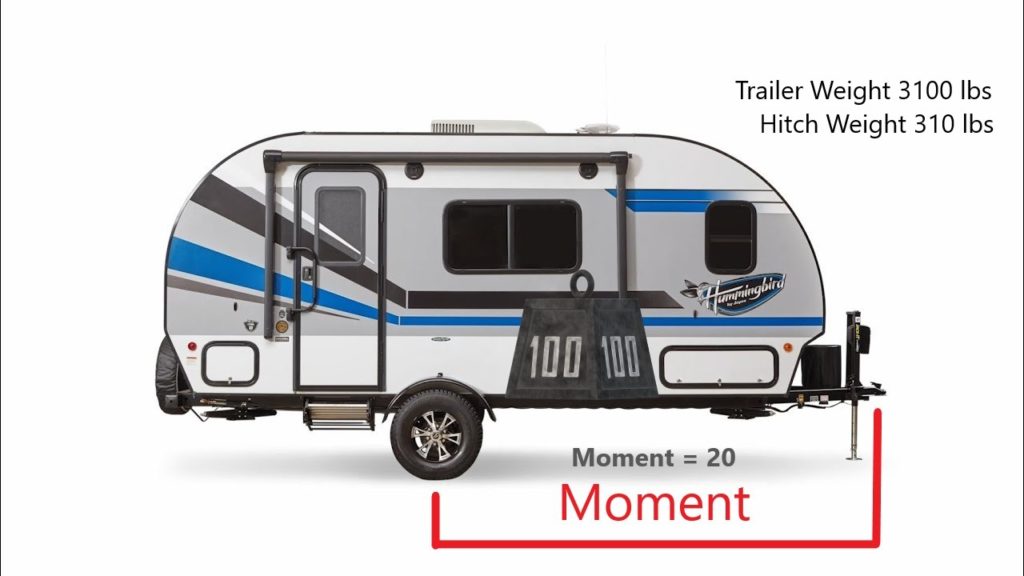
However, if you move that same 100 pounds further forward, the trailer weight does not increase, but the hitch weight does.
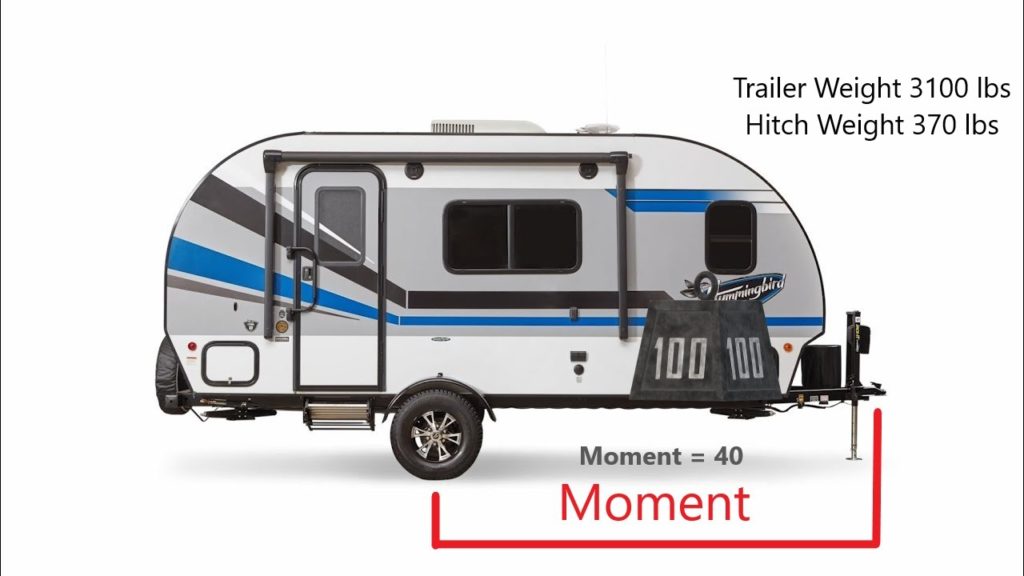
How does hitch weight affect my truck?
Hitch weight is the amount of weight that is being “carried” by the hitch and is therefore resting on the back end of the truck. The heavier the hitch, the more weight the truck carries. This is not a problem so long as the truck is able to carry this weight within it’s payload. Most large SUVs, mid-size and full-sized trucks have payloads within 1000-2000 pound range. This is the total weight that the tow vehicle can carry including, hitch weight, passengers, food, gear, etc.
When you are shopping for your first or next camping trailer, understand that the “hitch weight” on manufacturers’ brochures is the estimated/average “empty” hitch weight; those clothes, shoes, camping chairs, tool boxes, hoses, tables and gear placed forward of the axle can drastically changed the actual hitch weight. As the hitch weight increased, the payload requirement within the tow vehicle increased as well.
What if I exceed my payload?
If you exceed your payload, the rear of your vehicle will begin to sag, therefore lifting the front of the vehicle.
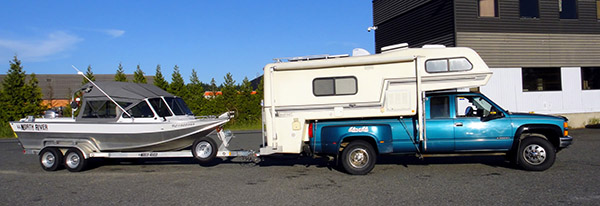
This can lead to several severe safety issues such as:
- Front wheel drive cars will have their drive wheels lifted from the road decreasing traction
- The rear axle will have greater weight than designed which can lead to increased load on the rear tires
- Higher than designed temperature, pressure and weight leading to tire failure / blowout
- Increased tire wear
- Damage to rear axle (especially in bumpy conditions)
- Failure of rear axle
- Decreased steering performance. This will be accentuated on windy days and at highway speeds even on calm wind days.
- Increased risk of loss of control
Fifth-wheels and Fifth-wheel Toy Haulers
Fifth-wheels and fifth-wheel toy haulers provide a slightly more stable towing platform given the type of connection to the tow vehicle. Because these trailers require a special hitch, they make them less common and require some sort of truck. Although it is possible to install a fifth-wheel / gooseneck hitch in a half ton (F150, Ram 1500, Silverado 1500) and three-quarter ton (F250, Ram 2500, Chevy 2500) it is often not appropriate for these trucks to be used to tow the biggest of the RV category; this is due almost entirely to the PAYLOAD capacity of these trucks, and not the towing capacity.
Taking a look at the Heartland Road Warrior line, compare the hitch weight (or “pin weight” on the right of each model to the capacities of the F150 and the F250 (and even the F350 SRW (single rear wheel, non-dully).
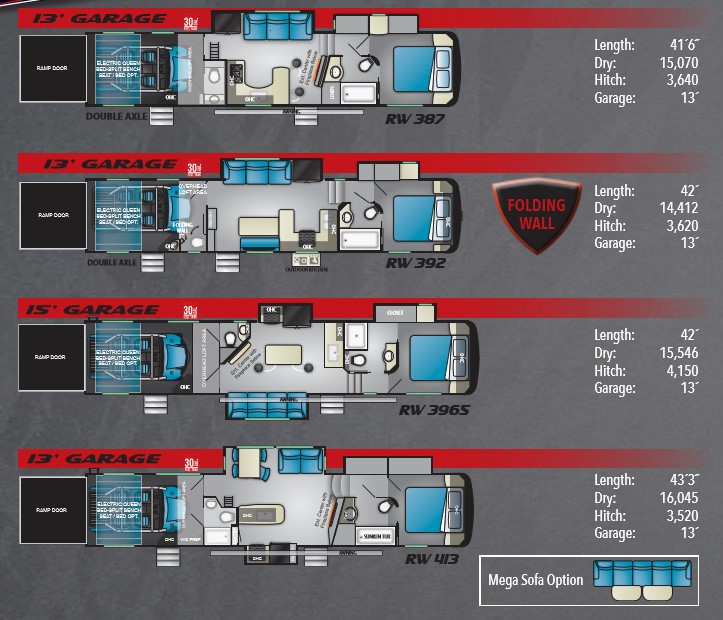
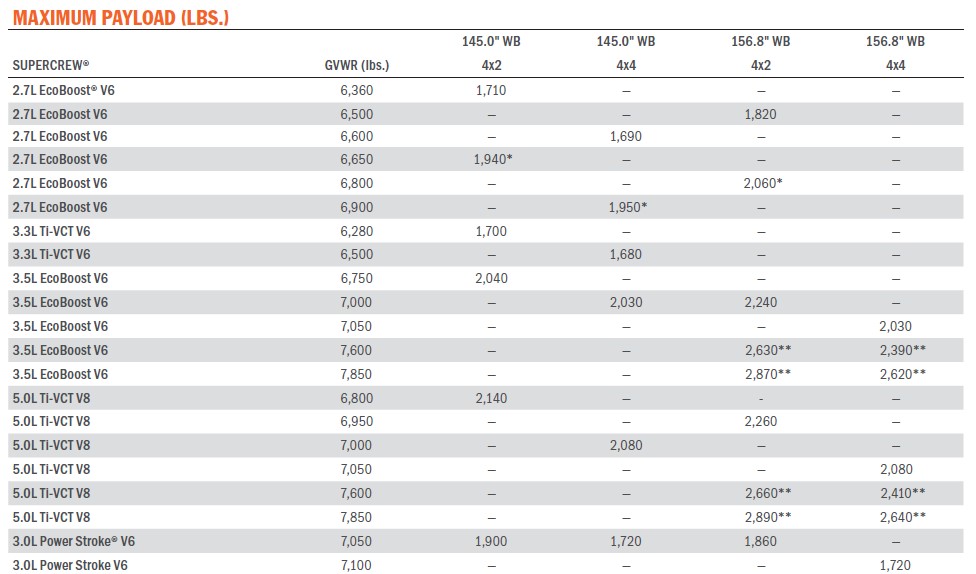
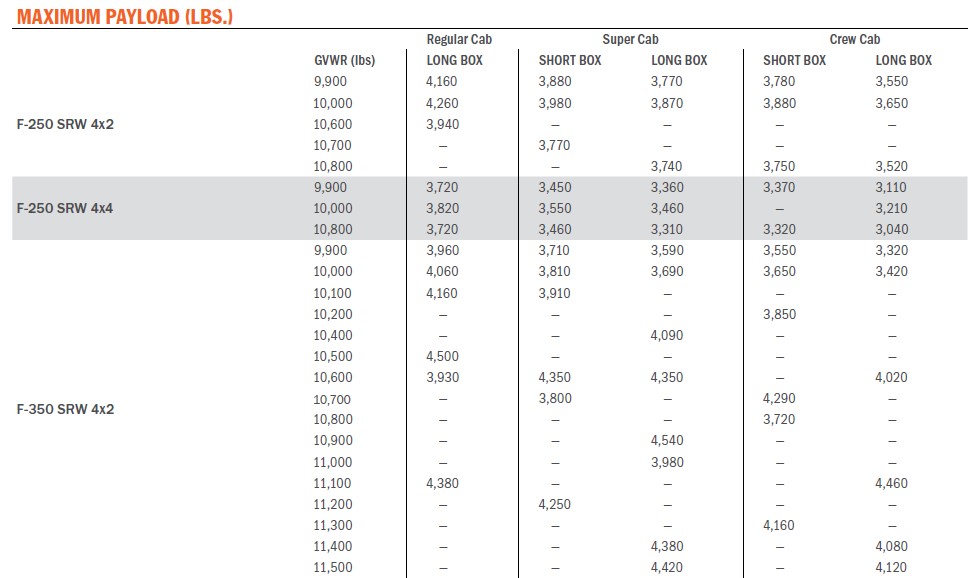
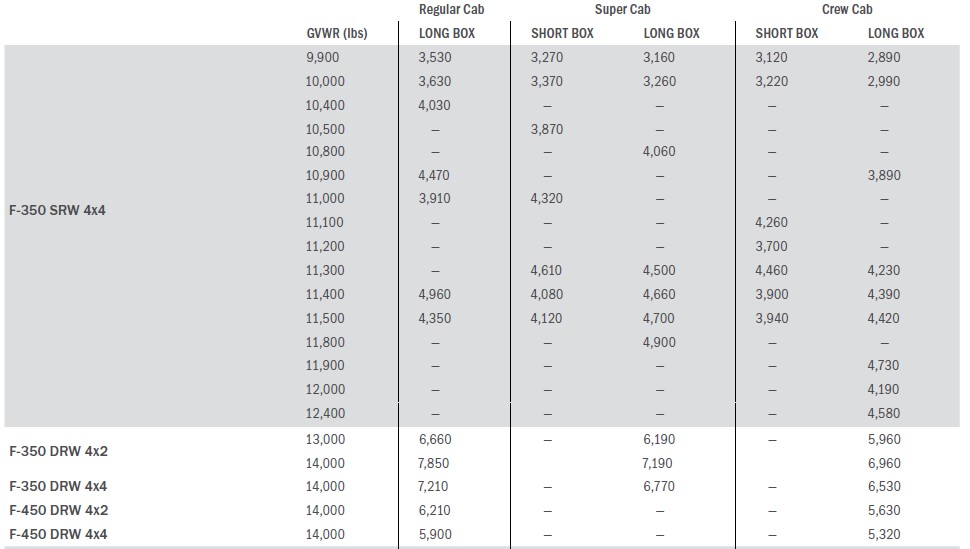
What truck do I buy?
In the years of research leading up to our decision to purchase a large fifth-wheel, we have reached to conclusion that most brands are nearly identical for their reliability and features. I would select the brand that suits you best for look, features, price range, style and then, using the spec sheet, decide which truck type will be necessary to tow the trailer you already own or are looking to buy.
In general, I would recommend these guidelines for truck / trailer combination:
- F150 / 1500 – travel trailer
- F250 / 2500 – travel trailer with increased ability to tow over non-flat or high altitude terrain (e.g. Colorado, Appalachians, etc.).
- F350 / 3500 SRW – fifth-wheels and certain fifth-wheel toy haulers
- F350 / 3500 DRW – fifth-wheel toy haulers
Many trucks and trailer types can be matched correctly, but certain combinations (such as the F350 / 3500 SRW and toy haulers) must be certain to pay careful attention when buying the trailer to ensure all payload and towing weights are still below the legal limits.
We hope this helps your research process and please leave a reply if we can assist with your journey in any way!
